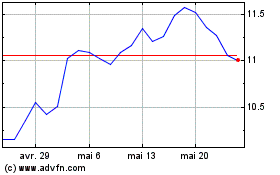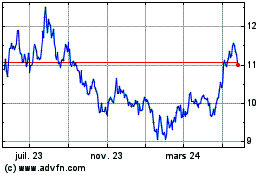Form N-CEN - Annual Report for Registered Investment Companies
10 Janvier 2024 - 6:08PM
Edgar (US Regulatory)
Section 16(a) of the Securities Exchange Act of 1934, requires the Fund’s directors and executive officers to file reports of ownership
and changes in ownership of their equity securities of the Fund with the Securities and Exchange Commission and to furnish the Fund with
copies of such reports. To the best of the Fund’s knowledge, all of the filings by the Fund’s directors and executive officers
were made on a timely basis during the 2023 fiscal year, except for Ms. Hu. A Statement of Changes of Beneficial Ownership of Securities
on Form 4 for Ms. Hu was not timely filed during the 2023 fiscal year due to an inadvertent administrative error. The Form 4 for Ms. Hu,
which was filed on September 29, 2023, related to a purchase of Fund shares executed on September 26, 2023. For timely filing, the Form
4 should have been filed one day earlier on September 28, 2023. In addition, the Initial Statements of Beneficial Ownership of Securities
on Form 3 for Ms. Hu and Ms. Noriega-Lum were not timely filed for the 2022 fiscal year due to an inadvertent administrative error. Ms.
Hu was elected as a Director of the Fund on May 3, 2022 and Ms. Noriega-Lum was appointed as President of the Fund effective January 1,
2022. To the best of the Fund’s knowledge, all of the filings by the Fund’s other directors and executive officers were made
on a timely basis during the 2022 fiscal year.
 |
taitweller.com |
REPORT OF INDEPENDENT REGISTERED PUBLIC ACCOUNTING
FIRM
To the Shareholders and Board of Directors
The China Fund, Inc.
Boston, Massachusetts
In planning and performing our audit of the financial
statements of The China Fund, Inc. (the “Fund”) as of and for the year ended October 31, 2023, in accordance with the standards
of the Public Company Accounting Oversight Board (United States), we considered its internal control over financial reporting, including
control activities for safeguarding securities, as a basis for designing our auditing procedures for the purpose of expressing our opinion
on the financial statements and to comply with the requirements of Form N-CEN, but not for the purpose of expressing an opinion on the
effectiveness of the Fund’s internal control over financial reporting. Accordingly, we express no such opinion.
The management of the Fund is responsible for establishing
and maintaining effective internal control over financial reporting. In fulfilling this responsibility, estimates and judgments by management
are required to assess the expected benefits and related costs of controls. A company’s internal control over financial reporting
is a process designed to provide reasonable assurance regarding the reliability of financial reporting and the preparation of financial
statements for external purposes in accordance with accounting principles generally accepted in the United States of America. Such internal
control includes policies and procedures that provide reasonable assurance regarding prevention or timely detection of unauthorized acquisition,
use or disposition of a company’s assets that could have a material effect on the financial statements.
Because of inherent limitations, internal control
over financial reporting may not prevent or detect misstatements. Also, projections of any evaluation of effectiveness to future periods
are subject to the risk that controls may become inadequate because of changes in conditions, or that the degree of compliance with the
policies or procedures may deteriorate.
A control deficiency exists when the design or operation
of a control does not allow management or employees, in the normal course of performing their assigned functions, to prevent or detect
misstatements on a timely basis. A significant deficiency is a control deficiency, or combination of control deficiencies, that adversely
affects the company’s ability to initiate, authorize, record, process or report financial data reliably in accordance with accounting
principles generally accepted in the United States of America such that there is more than a remote likelihood that a misstatement of
the company’s annual or interim financial statements that is more than inconsequential will not be prevented or detected. A material
weakness is a significant deficiency, or combination of significant deficiencies, that results in more than a remote likelihood that a
material misstatement of the annual or interim financial statements will not be prevented or detected.
To the Shareholders and Board of Directors
The China Fund, Inc.
Page Two
Our consideration of the Fund’s internal
control over financial reporting was for the limited purpose described in the first paragraph and would not necessarily disclose all
deficiencies in internal control that might be significant deficiencies or material weaknesses under standards established by the Public
Company Accounting Oversight Board (United States). However, we noted no deficiencies in the Fund’s internal control over financial
reporting and its operation, including controls for safeguarding securities, which we consider to be material weaknesses, as defined
above, as of October 31, 2023.
This report is intended solely for the information
and use of management, Shareholders and Board of Directors of the Fund and the Securities and Exchange Commission, and is not intended
to be and should not be used by anyone other than these specified parties.

TAIT, WELLER & BAKER LLP
Philadelphia, Pennsylvania
December 22, 2023
China (NYSE:CHN)
Graphique Historique de l'Action
De Avr 2024 à Mai 2024

China (NYSE:CHN)
Graphique Historique de l'Action
De Mai 2023 à Mai 2024
